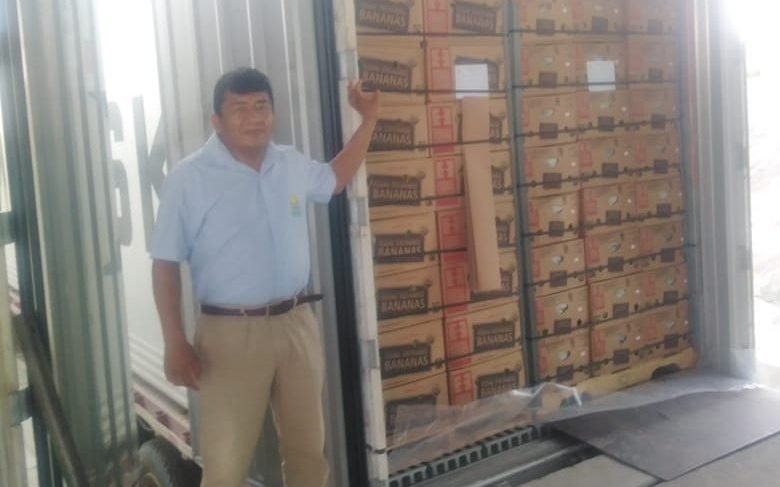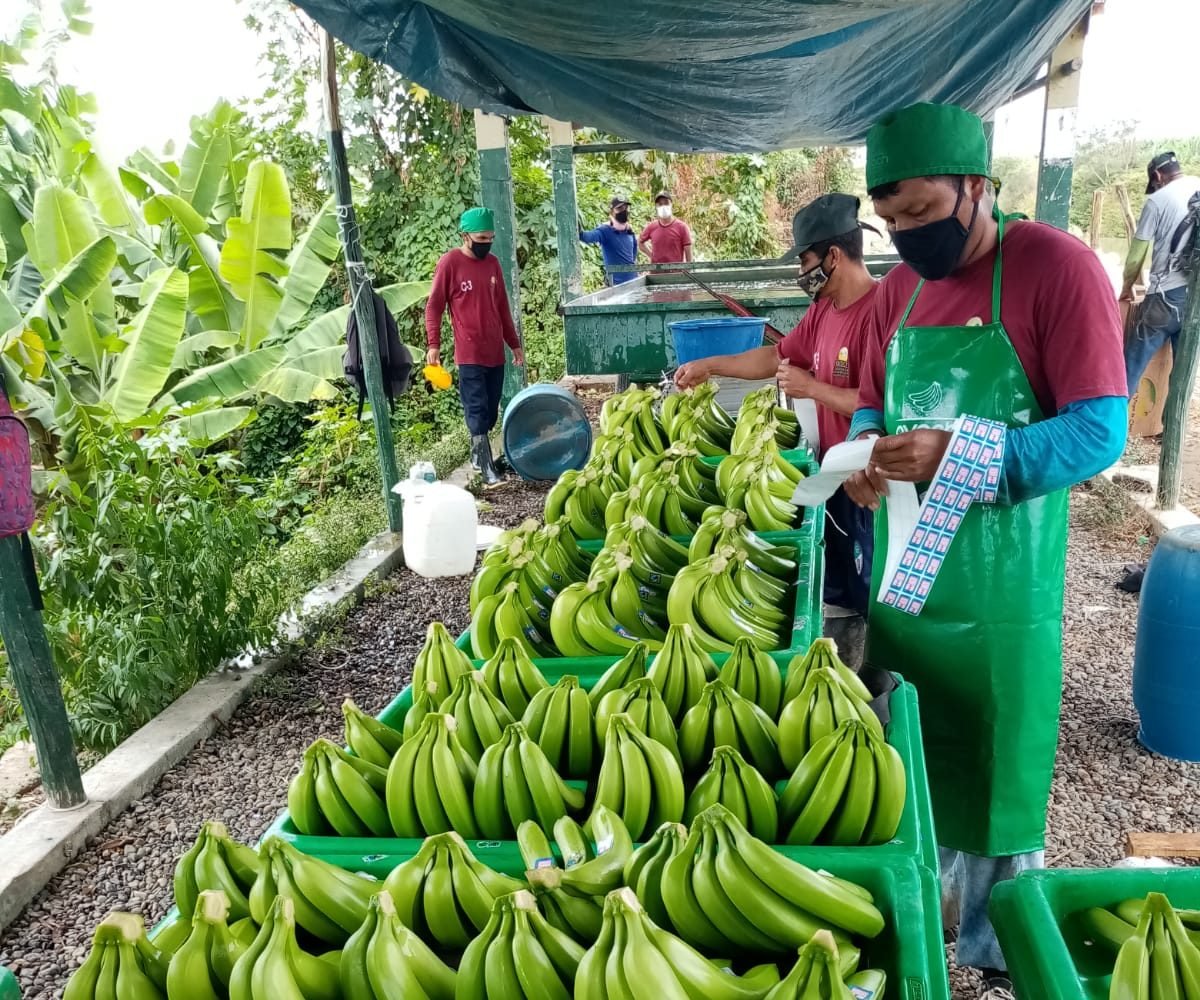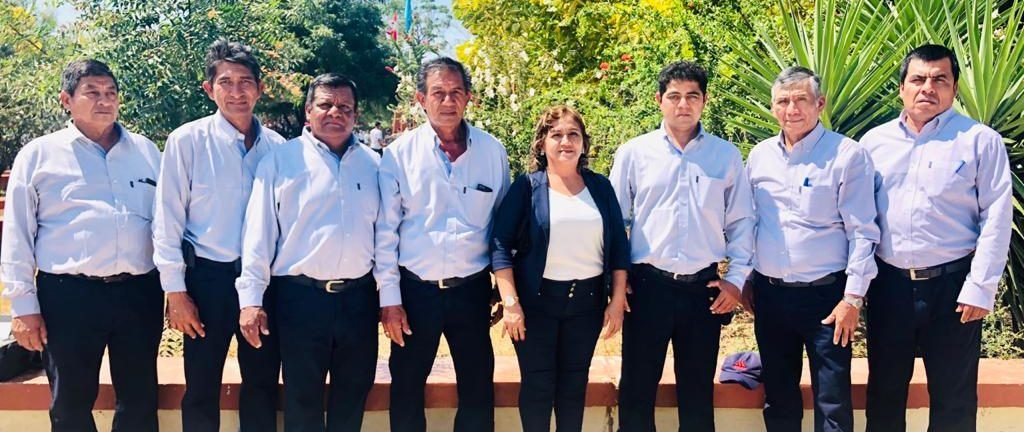“We Met Online”: Building A New Banana Partnership with AVACH During COVID-19
The 2021 board of directors for AVACH posing in front of the warehouse in Querecotillo, Piura, Peru
Equal Exchange Produce strives to maintain long-term, stable partnerships with banana producer organizations. Our baseline requirements are specific: the fruit we import is Fairtrade-certified, organic, and exported directly by cooperative small producer organizations (SPOs). But there is more to developing a commercial partnership than requesting up-to-date certifications. The fundamentally social – and logistically complex – nature of food trade requires developing trusting relationships with people at every level of production. In the world as we once knew it, that meant a trip to origin including farm tours, face-to-face meetings, maybe even a toast to celebrate a new partnership.
So when the time came to complete an onboarding process in the middle of the COVID-19 pandemic, it took more intentionality from all parties to communicate exclusively online. Asociación Valle del Chira (AVACH), a 412-member SPO based in Querecotillo, Piura, Peru, set out with a remarkable level of integrity to create space for Equal Exchange to meet with diverse stakeholders and encourage transparency from all entities. Now, six months after the first U.S.-bound AVACH container embarked, Equal Exchange has had the chance to deepen these foundational relationships and meet some additional players whose work is crucial to get bananas from the farm to the ship. Equal Exchange Supply Chain Coordinator Johanna Contreras Manito recently spoke with a logistics manager, a pack crew leader, and a farmer-member who each represent integral pieces of the supply chain. Read on to meet them and learn about their experiences this year.
Making things move
Santos Miguel Rojas Burgos, AVACH Export Logistics
Santos Miguel Rojas Burgos, Co-op Administrator, standing in front of a shipment of Equal Exchange bananas
There are many people working in different capacities to make an organization like AVACH run. In addition to 412 farmers and 200+ packing crew members, AVACH employs over 30 office staff members, who manage logistics, accounting, quality control, and business operations. Santos Miguel Rojas, who has been with AVACH for over 15 years, is one of those office employees. Miguel coordinates export logistics, which is no small job for a banana cooperative: once bananas are packed at AVACH’s warehouse, they are loaded into a shipping container and sent to the port to be loaded onto a steamship. That’s where Miguel’s expertise comes in: he receives orders, makes shipping reservations, and manages customs processes, among other responsibilities. On the side, he is an accountant, and also a banana farmer himself, owning 1.8 acres. The remainder of his time is spent with family.
The pandemic affected Miguel’s work, as restrictions and logistical challenges upended the stability of food supply chains and demand. It also took a personal toll for many at the co-op. Reflecting on the last year, Miguel said, “It completely changed our plans in every possible way… every member – farmers, packing crew, employees and board members – were all afraid of going to work.” AVACH, the community and neighboring organizations had to navigate ever-evolving limitations (curfews, police checkpoints and resource shortages) to continue business over the past year. Despite these challenges, they never stopped exporting, a testament to Miguel’s ability to adapt to unanticipated obstacles.
Unpacking the packing process
Junior Mena Rugel, AVACH Pack Crew Leader
When the fruit is ready on members’ farms, a packing crew comes to harvest, clean, and box it. AVACH employs 7 packing crews, each made up of 20 members. Each member has a specific role: harvesting from the plants, cutting the gigantic bunches into smaller clusters, selection, washing, labelling, treating the crowns with an organic solution,drying,and packing the fruit into 40lb boxes.
Most crew members live outside of Querecotillo, a mid-size city in the banana growing region of Peru. They meet in the morning and travel to that day’s destination in the countryside. Junior Mena Rugel is a pack crew leader, and has been working with AVACH for 10 years. He has been in a leadership position for the past two years, supervising quality and food safety. Since the start of the pandemic, he also now ensures that all measures are in place to guard workers’ health, a huge responsibility: “Before we start the work day, we meet to check in on how we are feeling – that each person feels healthy and well in order to work. If anyone feels ill…Valle del Chira [AVACH] has a doctor they can visit to screen for COVID. I make sure that every worker is protected and uses the PPE that is provided.”
Because the amount of work varies by the season, Junior also spends time working in his father’s rice plot along with farming his own 0.6 acres of bananas and a collection of livestock. When he’s not working with the pack crew he says he goes to work on his plot, spending Sundays with his wife and children. While spending weekdays with the packing crew and weekends with family offer some opportunity to socialize, Junior looks forward to the days when he can once again play sports with friends like he did pre-pandemic.
Where it all begins
Efraín Seminario Valdiviezo, AVACH Farmer-Member
Efraín Seminario Valdiviezo, farmer-member of AVACH posing in front of his bananas ready to harvest
Efraín is 43 years old and lives in Santa Sofía, Peru, with his wife and three children. Farming has been his life’s work. “I would have liked to study a technical degree when I was younger, but now I am happy as a farmer, especially with bananas.” In the past, Efraín farmed cotton, rice, corn and pigeon peas, like most farmers in the region, but says prices were low and very volatile. In 2011, he joined AVACH where he makes a stable, annually-negotiated price for his bananas and has a voice in the organization. In recent years, he has become more involved in co-op leadership and taken a seat on the board.
A typical day in Efraín’s life starts at 5am with household chores, such as caring for his animals, while his wife prepares breakfast. After breakfast, the crew, consisting of Efraín, Jhan (his adult son) and two farm workers head out into the field. “We are childhood friends,” says Efraín of the workers, who are also his neighbors. Work lasts from 7am – 12pm, Efraín details, “Jhan and one of the workers focus on fruit care: placing covers, removing the flower, tracking the age and calibrating for harvest. I only do the deshije – that is when you select the banana plant pup that will grow and cut the rest. The fourth person cleans the field of old leaves to avoid pests. We all join him sometimes too.” At noon they break for lunch, and only the family returns to the field through the evening.
The elected members of AVACH’s board in 2020 – Efraín stands third from the right.
As a board member, Efraín was a part of the many meetings with Equal Exchange to learn about each other’s organizations.Reflecting on his work and the challenges of the pandemic, Efraín concluded, “Hopefully we get medicine soon, but it also leaves us with a good lesson to be close to family, to value the little that one has – just one life – and appreciate it as much as possible.”
For the Equal Exchange banana team, who has been working from home for a full year now, sitting behind a computer screen can sometimes mean feeling disconnected from the work we share. But even after a year of keeping our distance, there are grounding reminders that none of us exists in a vacuum. The opportunity to create a new partnership with AVACH, even virtually, is one such reminder. Speaking with our new partners for this blog was a chance to recognize that we share the same feelings of loss and isolation, but also of pride in our work. The next time you pick up an Equal Exchange banana, remember that it connects you to the many people whose labor produced it, harvested it, transported it, and so on, and like Efraín reminds us, don’t take it for granted.
Written by the Equal Exchange Banana Team, Johanna Contreras Manito, Angelica Hicks & Monica Foss







